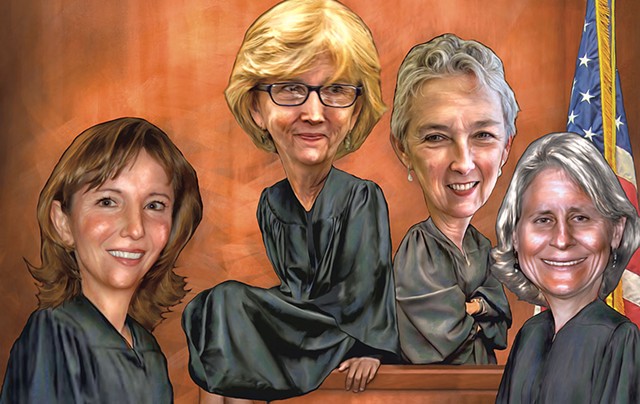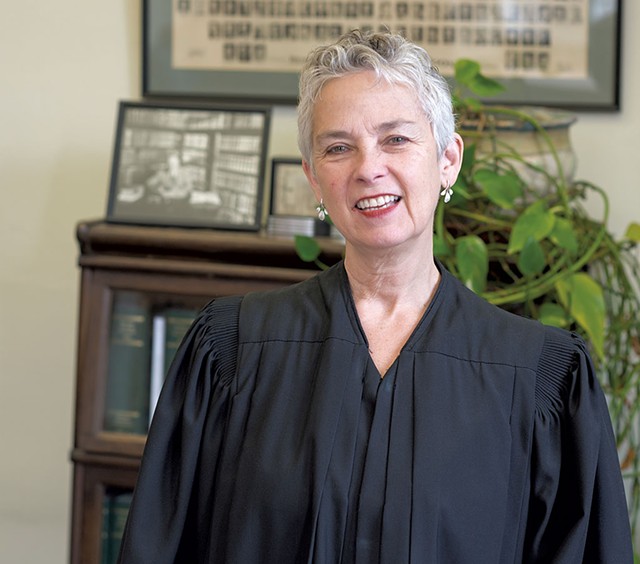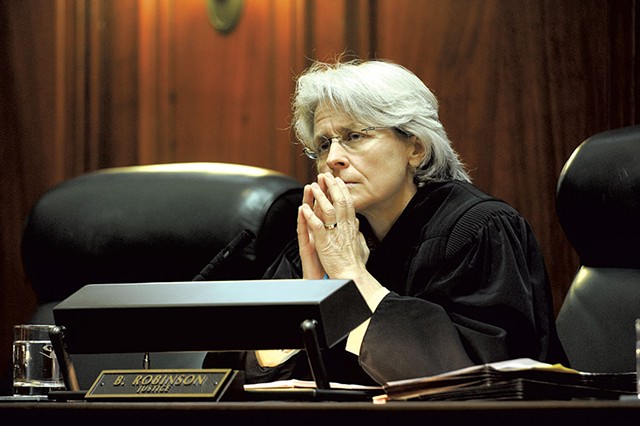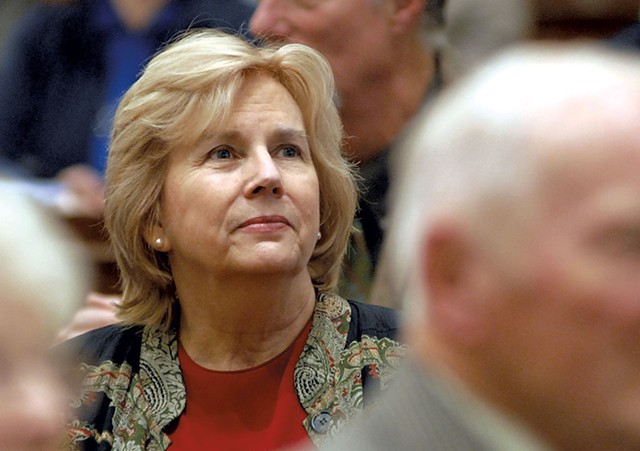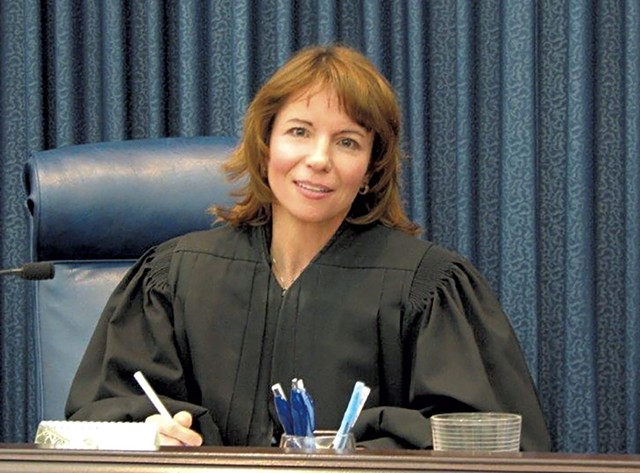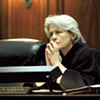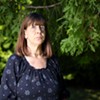Switch to the mobile version of this page.
Vermont's Independent Voice
- News
- Arts+Culture
- Home+Design
- Food
- Cannabis
- Music
- On Screen
- Events
- Jobs
- Obituaries
- Classifieds
- Personals
Browse News
Departments
Browse Arts + Culture
View All
local resources
Browse Food + Drink
View All
Browse Cannabis
View All
-
Business

Cannabis Company Could Lose License for Using…
-
Culture

'Cannasations' Podcaster Kris Brown Aims to 'Humanize'…
-
True 802

A Burlington Cannabis Shop Plans to Host…
-
Business

Judge Tosses Burlington Cannabiz Owner's Lawsuit
-
Health + Fitness

Vermont's Cannabis Nurse Hotline Answers Health Questions…
Browse Music
Browse On Screen
Browse Events
View All
Quick Links
Browse Classifieds
Browse Personals
-

If you're looking for "I Spys," dating or LTRs, this is your scene.
View Profiles
Special Reports
Pubs+More
Lady Justices: Four Vermont Judges Talk Law, Fairness and Being Female
Published December 12, 2018 at 10:00 a.m. | Updated December 19, 2018 at 10:48 a.m.
Female judges enjoy a 3-2 majority on the Vermont Supreme Court. But their numerical advantage does not always translate to respect.
"I've seen male attorneys arguing [before] the Supreme Court mix up the female justices' names," said Deputy Defender General Anna Saxman, a prominent Vermont attorney. "And I have seen the female justices interrupted, shockingly.
"A lot of people are completely unaware that they do that," Saxman said of those who preempt the state's highest-ranking interpreters of the law. "I'm not unaware, and I'm guessing that the justices aren't unaware, either."
A little context: Vermont has famously never elected a woman to U.S. Congress, and the state has had only one female governor. Yet 33 women now serve as judges in the state, according to the National Association of Women Judges. That means women hold 39 percent of judgeships in Vermont — slightly above the national average of 33 percent.
The judiciary has come a long way toward gender parity since 1984, when Linda Levitt became the first woman appointed to the trial bench.
Similarly, women in law today have no shortage of national role models, including U.S. Supreme Court Justice Ruth Bader Ginsburg. Appointed in 1993 by then-president Bill Clinton, "RBG" has become a liberal icon and even a pop culture phenom.
The Vermont Bar Association is hosting a panel discussion, Women in the Judiciary, on Wednesday, December 12, at the Courtyard Burlington Harbor on Cherry Street.
Samantha Lednicky and Alison Milbury Stone, lawyers and bar association officers, said the confirmation hearings for Ginsburg's newest colleague, Supreme Court Justice Brett Kavanaugh, inspired them to organize the event. Christine Blasey Ford testified that Kavanaugh had sexually assaulted her when they were high school students.
"That had me thinking about the importance of having women in positions of authority and having women's voices heard," Stone said.
"My entire office was glued to the television the entire workday," Lednicky said. "The way that they presented themselves, the way the questions were asked of them, the whole circus behind it made me think we need to have more discussion in our legal community about how women are perceived and presented."
In advance of the event, Seven Days questioned the four scheduled speakers: Associate Vermont Supreme Court Justices Marilyn Skoglund and Beth Robinson, U.S. District Court of Vermont Judge Christina Reiss, and Vermont Superior Court Judge Helen Toor have never shared the same stage.
None of the four was born in Vermont, either. Some came to the state intentionally, others by accident. Some methodically built their legal careers step-by-step. One never attended law school.
Although they downplayed the difficulties of being women in power, all faced tough situations related to gender when they started as attorneys. At the time, judges were almost exclusively male.
They spoke about juggling their sick children and court appearances, fairness, and their love of legal logic.
"Yes, we are in a better place than back then," Lednicky conceded. "But ... we are nowhere near where we need to be."
— M.D.
'Badass': Helen Toor
Judge Helen Toor has one of those eerily reasonable voices — as unflappable as Siri's, with a cheerful lilt. She could tell you to saw off your own hand with a Swiss Army knife and make it sound like a logical, even delightful, proposition. In a courtroom filled with unhappy litigants, this soothing-but-not-wimpish tone can make all the difference in the world.
Toor, a Vermont superior court judge serving a one-year rotation in Chittenden County, has a reputation for being cool as a cucumber, which you need only google her name to observe. "Judge vs. angry plaintiff," a YouTube video with more than 70,000 views, shows her in classic form, calmly explaining to said angry plaintiff that the fact that he hadn't eaten since 5 p.m. the previous evening did not constitute sufficient grounds to delay his trial.
"She's very even-keeled in the courtroom — balanced and fair, but not robotic," said Stacy Graczyk, an Addison County prosecutor who tried her first case before Toor in 2012. "She can be really tough, but she's also really compassionate."
Ashley Hill, a deputy state's attorney in Washington County, has a phrase for Toor's tough-but-compassionate demeanor: "She swore me in in Addison County in 2013, and afterward, I think I described her as a 'badass,'" Hill recalled. "She's probably one of the smartest people I've ever met. She's always straightforward and transparent, which isn't necessarily the case with all judges."
Toor, 62, grew up in Pittsburgh, the daughter of über-academics: Her father, who passed away in 2011, was the dean of Carnegie Mellon's College of Engineering; her mother, 91, holds a PhD in chemistry.
"My parents raised me and my two brothers to believe that we could do pretty much anything," Toor said last week in her chambers in the Chittenden County Superior Courthouse, after presiding over a docket of relatively ho-hum debt hearings. "Having a really strong mother, I guess I was somewhat oblivious to the fact that there might be barriers."
Growing up, Toor breezed through high school and graduated at age 15. She considered not going to college, but working late-night shifts at a Pittsburgh pizza joint convinced her of the merits of higher ed. ("Talk about sexual harassment," she said, rolling her eyes.)
She enrolled at Chatham College, now Chatham University, then an all-women's school in Pittsburgh that counts environmentalist Rachel Carson among its alumnae. Toor, an aspiring naturalist, left after a year to attend the University of Vermont, where an environmental law course sparked her interest in the legal profession. After graduating in 1978, she went to the University of Chicago Law School, forearms nicely toned from a summer job scooping ice cream at the original Ben & Jerry's shop in Burlington.
Back then, reminisced Toor, it was big news when the Chicago Law School hired its first female professor, and her class was a little more than one-third women. Still, Toor insisted that she almost never felt outnumbered or underestimated. At the New York City firm where she got her first job out of law school, one client didn't take particularly well to being represented by a woman — "but he came around when I pointed out that I was keeping him out of jail," she said.
That job did have an unexpected perk: The firm, Rosenman & Colin, was involved in a dispute between the band Kiss and its record label, and Toor got to see an unpainted, button-down-clad Gene Simmons in a courtroom.
Toor practiced for about seven years in NYC, including two years in the U.S. Attorney's Office in Manhattan, but she always had her heart set on returning to Vermont. In 1989, she landed a job as chief of the civil division for the U.S. Attorney's Office in Vermont. After she spent 10 years in that post, then-governor Howard Dean appointed her a superior court judge.
Toor's specialty is civil cases, which tend to involve more outside-the-courtroom homework than criminal cases. She loves the quiet, scholarly stuff — the reading, analysis and writing. She's not one to shoot from the hip; when in doubt, she said, she takes the time to write a decision.
Toor may be the cerebral type, but she's far from cold-blooded: Graczyk remembers seeing her well up during a sexual assault trial as the victims testified. When people who aren't attorneys represent themselves, Toor makes sure they understand what's going on.
"It's hard to watch a lawyer on one side and someone without a lawyer on the other, who might not really understand the issues or how to present their case," she said.
In 2014, with the help of Law Line of Vermont, Toor established a program in Chittenden County to connect people facing eviction with pro bono attorneys. Since its inception, the clinic has been replicated in Addison, Rutland and Washington counties, and plans are in the works to expand to the St. Johnsbury area. Angele Court, director of the Vermont Volunteer Lawyers Project, estimates that in Chittenden County alone, the program has helped more than 100 clients this year.
"Judge Toor has high expectations of the legal system," said Court. "She really values integrity and wants to make sure everyone has access to the courts in a fair way."
Toor acknowledged that her advocacy of the pro bono clinic has led some people to claim that she's biased in favor of tenants. In her view, she's just trying to make the whole process more equitable.
"The system favors people who can hire legal representation," she said. "I'm simply trying to level the playing field a bit."
Last week, Toor presided over a debt case in which the defendant, a young woman representing herself, seemed willing to accept the terms of a repayment deal. During the hearing, Toor addressed her directly.
"Do you understand what you're agreeing to?" she asked, smiling wryly. "Sometimes, lawyers use a lot of words to say something simple."
— C.E.
'Persuasive Intellect': Beth Robinson
Associate Justice Beth Robinson made legal history long before her appointment six years ago to the Vermont Supreme Court.
She served as cocounsel in Baker v. State of Vermont, the case that secured the landmark 1999 decision that led to Vermont's first-in-the-nation law allowing LGBT couples to enter into civil unions. A decade later, as chair of the advocacy group Vermont Freedom to Marry, Robinson was a key backer of the 2009 law that extended full marriage benefits to same-sex couples.
Becoming a Supreme Court justice "was never part of my life strategy," said Robinson, 53. "The marriage-equality work was never a next step in my career. It was an end to itself."
Growing up in Indiana, Robinson envisioned becoming a physics teacher. But after graduating from Dartmouth College, she went off to the University of Chicago Law School, as Toor had done roughly a decade earlier.
It wasn't until a summer clerkship at the Burlington and Middlebury firm of Langrock, Sperry & Wool that Robinson got "hooked" on law and decided to make it a career.
She spent 18 years at the firm, focusing primarily on civil cases. She impressed Peter Langrock, one of its founders.
"Whenever I disagreed with her, I immediately tried to figure out where I was wrong. The only other person I have had that with is Ruth Bader Ginsburg," said Langrock, who served on an American Bar Association committee with "RBG" before she became a U.S. Supreme Court justice. "They both have that quiet, persuasive intellect, and if they're taking a position different than yours, you had better reevaluate yours."
Robinson and another attorney at the firm, Susan Murray, sued the state in July 1997 on behalf of three same-sex couples who had been denied marriage licenses by their town clerks. The Vermont Supreme Court ultimately ruled in December 1999 that the state's marriage laws were unconstitutional but punted to the legislature the question of how to fix them. Lawmakers responded with the tumultuous passing of the 2000 civil union bill. A decade later, the legislature went a step further and legalized same-sex marriage.
The experience showed Robinson how a legal issue could gain traction outside the court.
"Judges don't live in a vacuum, and every judicial decision is subject to some sort of political response, whether it be statutory, executive or constitutional," Robinson told a constitutional law symposium at New Jersey's Seton Hall University in May 2001. "It's not enough to win the battle of the case if you go on to lose the war."
During the 2009 legalization fight, Robinson got to know then-Senate president pro tempore Peter Shumlin, a key backer of the marriage bill. She endorsed Shumlin's 2010 gubernatorial campaign, rallying support for him in the LGBT community, and became his general counsel after he won. She vetted Shumlin's judicial nominees until 2012, when the governor tapped her for the high court.
Robinson said she has rarely felt disadvantaged by her gender. Langrock, Sperry & Wool had several powerful female attorneys on staff before she arrived. On the Supreme Court, she replaced former associate justice Denise Johnson and joined Marilyn Skoglund, who had already been toiling on the bench for 14 years.
"I've been very lucky," Robinson said. "I had a strong critical mass of women who already paved the way and did the work I didn't have to do."
Robinson is the first openly gay person to serve on the court — a milestone she also downplays.
During oral arguments, Robinson tends to be one of the court's quieter justices. But she's direct and jokingly recommended that a reporter bring coffee to help get through an interview with her — suggesting, inaccurately, that she would be a dull subject.
This is a Supreme Court justice who gets animated talking about the nuances of Act 250 or zoning laws. She said she finds herself saying, "Whoa, this is interesting," while delving through hundreds of pages of briefs in seemingly mundane cases.
"Often, you're learning about some issue, some idiosyncratic aspect of a particular case, like a piece of equipment at the center of a case, or a subculture," Robinson said. "I haven't ever found these cases boring."
Other lawyers appreciate her inquiring mind.
"Justice Robinson is incredibly smart and showed a great willingness to really understand the depth of an argument," said Deputy Defender General Anna Saxman, one of the women at Langrock, Sperry & Wool when Robinson arrived at the firm. "She is not going to take anything superficially. If there was an area she wasn't familiar with, she made an amazing effort to understand it on a deep plane."
One thing that has surprised Robinson is how lonely the bench can be. While the public might imagine that Supreme Court jurists spend their days debating fellow justices, much of the work is quiet and solitary: drafting opinions, writing comments on other justices' proposed opinions, reading legal papers.
"I love the intellectual puzzle and legal puzzle, but I miss the more human level of interaction," Robinson said. "When I was in private practice, I had clients. They were real people with real problems, and I sat with them in my office and talked, and we went through a difficult thing together. There were a lot of relationships built into my day's work. I didn't think of myself as an extrovert until I started this job."
— M.D.
'Practical and Real': Marilyn Skoglund
On the reverse side of her official Vermont Supreme Court nameplate, Associate Justice Marilyn Skoglund stares at a single word: "decorum." It serves as a reminder to Vermont's most gregarious justice, who laces her conversation with occasional profanity. But she doesn't always heed the warning.
"Judges are human. Some are fun; some are dull; some have a sense of humor. I'm a lot more fun than most of them," Skoglund said, unleashing her trademark cackle.
Skoglund took the most unusual career path of anyone on the state Supreme Court. She majored in art in college. She reached the high echelon of her profession without ever stepping foot in law school. Among colleagues, she is known for hosting poker nights, book clubs and jam sessions. She was a driving force behind turning the Supreme Court lobby into a rotating gallery for local artists.
"I took every road that showed up," Skoglund said of her life. The 72-year-old claims an eclectic group of friends.
Skoglund grew up in St. Louis and, as a kid, played drums and clarinet. She took seven years to complete her undergraduate art degree at Southern Illinois University because she pursued so many classes outside her major.
While in college she also got married. She had already given birth to her first daughter when she and her now ex-husband moved to Vermont. He landed a teaching job at Goddard College.
Skoglund got a clerkship at the Vermont Attorney General's Office and decided to "read the law." Vermont is one of the few U.S. states in which it's possible to pursue independent legal studies, pass the bar exam and obtain a law license without earning a legal degree.
She became a lawyer in 1978.
"I fell in love with the law," Skoglund said. "The logic, the common sense, it just blew me away. I became a lawyer, and I was happy as a clam..." She paused to reconsider the simile. "How happy are clams? I don't think clams would be considered happy critters."
For 17 years, Skoglund stayed in the Attorney General's Office, focusing mostly on civil law.
She was also raising two daughters as a single mom. Skoglund said she spent the night before her first appearance as a lawyer in front of the state Supreme Court crouched beside the toilet with her 8-year-old, who had the flu. On another occasion, when Skoglund litigated a case before the state's Board of Medical Practice, she was forced to bring a sick kid to a hearing. Skoglund left her daughter in the hallway outside the board's meeting room and had a pediatrician who served on the board periodically check on her.
"She's a real pull-yourself-up-by-your-bootstraps person," said former associate justice Brian Burgess, a close friend. "I'm sure she's cognizant of that and ought to feel some sense of pride. She never lords it over anybody, but she's been there. She's not one to get lost in esoterics in law. She's always practical and real, and I'm sure it's because she's had a real, practical life."
In 1994, then-governor Howard Dean appointed Skoglund to serve as a state judge. She was enthralled by many of the legal arguments she refereed.
"It was the amazing entrée to the human condition," she said. "The variety was mind-boggling. I would sit up there and think, I should have popcorn and lemonade, because this is fabulous."
But work as a trial court judge, which involves long hours, lengthy commutes and emotionally wrenching cases, took a toll on Skoglund. Her cholesterol spiked, and she gained weight. She was ready for the slightly slower pace of a state Supreme Court justice when she was nominated in 1997.
Asked whether she had been hindered by sexism, she shook her head and held up the index finger on her right hand. Like many mothers, Skoglund said, she used the gesture to get her children's attention. It has proven equally powerful on the bench, she said.
"As a woman judge, I think I have a benefit, honest to God," Skoglund said. "Everybody in this life has had a mother, a grandmother, a teacher put their finger up and say, 'Just a minute.' It works. I have not felt handicapped being a woman."
But that's not the full story, she admitted after gentle prodding from her legal clerk. There have been the occasional sexist comments and other slights: A male attorney once asked after a court hearing why she wasn't wearing high heels. She was eight months pregnant.
When she was growing up and insisted she'd have a career, her father suggested that she become a teacher or a nurse. In high school, Skoglund said, she wanted to become an anthropologist. A guidance counselor urged her to take a typing class instead. Skoglund declined.
Last week, though, she was busy tapping out a dissenting opinion that she proudly proclaimed was "great."
"I think I will get a lot of comment from my brothers and sisters on the court. But no one will join me," she said, unleashing another cackle. "They're all chicken."
— M.D.
'She Really Cared': Christina Reiss
In September 2008, Christina Reiss was a state district court judge presiding over an involuntary manslaughter case in Chittenden County. Timothy Madden, 38, of Georgia, had been charged with shooting a hunting companion whom he had mistaken for a coyote.
But during the trial, another tragic accident occurred: An errant bullet from a makeshift shooting range struck and killed Reiss' father while he was eating dinner in his Essex home.
His daughter would later say that she could have ruled fairly in Madden's case, despite the circumstances of John Reiss' death. But she recused herself anyway, to eliminate even the appearance of potential bias.
For the past eight years, Christina Reiss (pronounced "rice") has been hearing federal cases as Vermont's first-ever female Article III judge — that is, appointed for life by the president. Lawyers say she continues to ensure that defendants receive a fair trial.
"When she's on the bench, she'll talk to me, she'll talk to my client, she'll talk to the prosecutor and addresses us all in the same way and with the same respect," said Burlington criminal defense lawyer Mark Kaplan. Though Kaplan said his clients aren't always happy with the tough sentences that Reiss hands down, "they feel like she really cared and thought about it and did what was right."
"She's known to really dig into the cases and be prepared," said Vermont Law School assistant professor and lawyer Jared Carter. "In the times I've been in front of her, I felt respected as an attorney, I felt challenged as an attorney, and I felt she was prepared to deal with the legal issues of the case and give everyone a fair shake."
Reiss presides over a variety of criminal and civil cases. They've ranged from garden-variety drug-smuggling cases to matters related to the EB-5 fraud case involving former Jay Peak developers Ariel Quiros and Bill Stenger. Reiss also handled the case against filmmaker Malcolm "Mac" Parker, whose decade-long Ponzi scheme bilked investors out of millions. Last year, Reiss presided in the case against 71-year-old former Wake Robin resident Betty Miller, who tried to poison fellow residents with her homemade ricin.
The 56-year-old Reiss was born in Denver, Colo., in 1962, and has lived in the Green Mountain State since the early 1980s. She earned her bachelor's degree at Saint Michael's College in 1984 and her law degree from the University of Arizona in 1989.
Appointed to state district court in 2004 by then-governor Jim Douglas, a Republican, Reiss wrote some decisions that were unpopular but reflected a strict adherence to constitutional law. In December 2007, she presided over a murder case against Kenneth Bailey, who had been charged with a 1971 killing. Key evidence, including bullets, a witness statement and crime scene photos, had gone missing.
Reiss dismissed the case.
In her ruling, she emphasized that she wasn't punishing the state for its "egregious loss of evidence" but was "safeguard[ing] the defendant's constitutional right to a fair trial." She told Seven Days in 2010, "Sometimes the easier decision, or the more popular decision, is not necessarily the right one."
On the federal bench, Reiss has issued consequential rulings. In 2016, she upheld Vermont's first-in-the-nation law requiring that food producers disclose on labels the presence of genetically modified ingredients. But Reiss's decision was also seen as a partial victory by the law's opponents, including the powerful food industry group Grocery Manufacturers Association, because it recognized their First Amendment right to protected commercial speech.
Like most judges, Reiss is reluctant to say anything to a reporter that would reveal how she might rule in future cases.
She's no less careful when answering questions about President Donald Trump's personal attacks on federal judges and growing politicization in the aftermath of the U.S. Senate's confirmation hearings for Brett Kavanaugh.
Reiss wrote, "I am proud to be part of the federal judiciary" in an email response last week.
She's more forthcoming with the newer judges, both male and female, who seek her counsel now that she has been on the bench for 14 years. Reiss said she often shares words of wisdom she received from then-state court judge Alan Cheever when she considered applying for a judgeship.
"One of the things he said to me is, 'Not everyone's going to love you,' which was unexpected because he was a very well respected and kindhearted judge," Reiss recalled. "He also explained what it feels like when you get harsh criticism and have no way to respond to it, and what it feels like to get reversed [on appeal]. It stings. I try to mentor the people who approach me in the same way [and] ... give it to them straight."
Asked about that sting of being overruled by appellate judges, Reiss showed humility.
"Even if I disagree with the higher court's analysis or outcome, there is usually something I could have done better."
— K.P.
The original print version of this article was headlined "Lady Justices"
Related Locations
-
Courtyard Marriott Burlington Harbor
- 25 Cherry St., Burlington Burlington VT 05401
- 44.47895;-73.21840
-
 802-864-4700
802-864-4700
- www.marriott.com…
Related Stories
Got something to say?
Send a letter to the editor
and we'll publish your feedback in print!
Tags: Crime, Courts, Judiciary, Helen Toor, Beth Robinson, Marilyn Skoglund, Christina Reiss, judges, Courtyard Marriott Burlington Harbor

Chelsea Edgar
Bio:
Chelsea Edgar is a staff writer for Seven Days, and has written for BuzzFeed and Philadelphia magazine.
Chelsea Edgar is a staff writer for Seven Days, and has written for BuzzFeed and Philadelphia magazine.
Ken Picard
Bio:
Ken Picard has been a Seven Days staff writer since 2002. He has won numerous awards for his work, including the Vermont Press Association's 2005 Mavis Doyle award, a general excellence prize for reporters.
Ken Picard has been a Seven Days staff writer since 2002. He has won numerous awards for his work, including the Vermont Press Association's 2005 Mavis Doyle award, a general excellence prize for reporters.
Speaking of...
-

Trials & Tribulations: A Week Inside Vermont's Busiest Courthouse Reveals a Judicial System Plagued by Delays
May 28, 2024 -

Out of House and Home: Chittenden County Landlords Are Evicting at a Record Pace. But It’s the Sheriff Who Comes Knocking.
Dec 6, 2023 -

A Conservative Legal Group Finds Plenty to Litigate in Vermont
Aug 2, 2023 -

Judge Tosses Trooper's Claims Against Seven Days, Human Rights Commission
Mar 24, 2023 -

Vermont’s Judiciary Is a National Example of a COVID-19-Disabled System
Jan 12, 2022 - More »
Comments
Showing 1-1 of 1
Comments are closed.
From 2014-2020, Seven Days allowed readers to comment on all stories posted on our website. While we've appreciated the suggestions and insights, right now Seven Days is prioritizing our core mission — producing high-quality, responsible local journalism — over moderating online debates between readers.
To criticize, correct or praise our reporting, please send us a letter to the editor or send us a tip. We’ll check it out and report the results.
Online comments may return when we have better tech tools for managing them. Thanks for reading.
- 1. Neighbor Charged With Murdering 82-Year-Old Enosburg Woman Crime
- 2. A Farting Bear Caught on Camera Is What We All Needed to See True 802
- 3. Rita Mannebach Traveled From Florida to Vermont to Choose How She Died Health Care
- 4. Immigration Officials Illegally Deported Vermont Family, Advocates Say News
- 5. An Inmate’s Pleas About Her Dangerous Cellmate Were Dismissed. Then She Was Attacked. Crime
- 6. Vermont Farmers Experience a Second Devastating Summer of Flooding Environment
- 7. Some Residents Flooded Out of Plainfield Think Goddard’s Campus Should Become Home Economy
- 1. A Farting Bear Caught on Camera Is What We All Needed to See True 802
- 2. Rita Mannebach Traveled From Florida to Vermont to Choose How She Died Health Care
- 3. Moving on From Its Industrial Past, St. Johnsbury Is Attracting Young Entrepreneurs and Building a Vibrant Downtown Economy
- 4. Heavy Rains Hit Vermont Again as Flooding Washes Out Roads News
- 5. Neighbors Band Together to Save Cattle From Hinesburg Floodwater Environment
- 6. Vermont Health Officials Prepare for Bird Flu as It Spreads in Dairy Herds News
- 7. Vermont's 'Orwellian' Butter Gets a Shout-Out in Hit Show 'The Bear' True 802


























